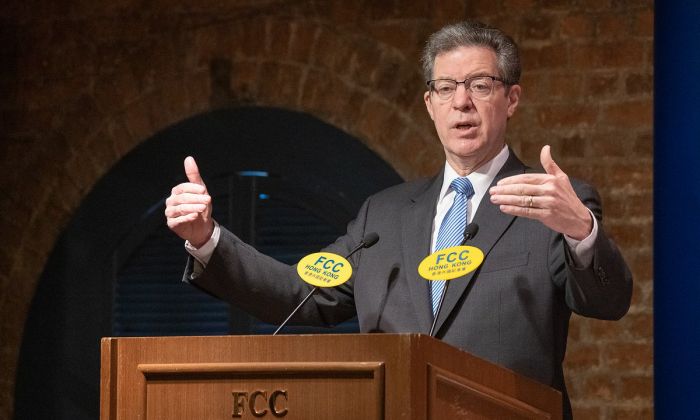Sam Brownback, the U.S. Ambassador for Religious Freedom, delivered a speech during a visit to Hong Kong strongly criticizing the People’s Republic of China for its “war on faith.” Speaking at the Foreign Correspondents’ Club on March 8, Brownback decried the Chinese Communist Party’s extensive persecutions, which range from anti-religious propaganda and indoctrination to torture and murder of religious believers in concentration camps.
Under the International Religious Freedom Act of 1998, the United States has since 1999 continuously listed the PRC as a “country of particular concern,” which is the most serious category in the Act. “The Chinese Communist Party must hear the cries of its own people for religious freedom and act to correct its wrongs,” Brownback said.
The major faiths suffering persecution in China include Christians, Muslims, Buddhists, and adherents of the Falun Gong spiritual practice. People who persist in their faith are ostracized, receive threats from the Communist Party authorities, or jailed.

The first ever ‘Ministerial to Advance Religious Freedom’ around the world was hosted by Secretary Pompeo, focusing on concrete ways to combat and end religious persecution around the world. (Image: Hermann Rohr / Vision Times )
Religious believers have consistently made up a large percentage of Chinese citizens held in labor camps and concentration camps. In the nearly 20 years since the beginning of the persecution of Falun Gong in 1999, millions of practitioners may have been incarcerated. Today, an estimated 1 million Uyghurs, who practice Islam, are languishing in concentration camps where torture and slave labor is common.
While describing the broader forms of religious persecution in China, Brownback also singled out the crime of forced organ harvesting from prisoners of conscience. “Data from brave persistent researchers raise concerning questions regarding the organ transplantation system in China, with voluntary donations unable to meet the demand. This is a truly horrifying prospect.”
Success
You are now signed up for our newsletter
Success
Check your email to complete sign up
Human rights researchers have raised allegations of organ harvesting in China since 2006. Prisoners have their vital organs surgically removed while they are still alive, dying horribly in the process. The main victims of organ harvesting are Falun Gong practitioners, but the practice is first known to have been used in 1995 on the Uyghurs.
Concerning the issue, Brownback the Chinese government “must address the whereabouts of missing [Falun Gong] practitioners.” He also requested the CCP to allow him to inspect the Xinjiang concentration camps.

The Chinese government now forces Uyghur residents to install a surveillance app on their mobiles to monitor their activities. (Image: wikimedia / CC0 1.0)
The U.S. government has been putting more economic and diplomatic pressure on China in the last several years. “The U.S. feels very strongly about it and is aggressively pushing for the religious freedom agenda [with China],” Brownback told the South China Morning Post in an interview.
“There are sanctions for countries of particular concerns that exist and there are other tools that can be used. And the Congress has expressed more interests in this… so there is bipartisan support for this push,” he told the Post.
In December 2018, the United States passed its “Reciprocal Access to Tibet Act.” The law that calls for the U.S. government to investigate which Chinese officials are responsible for restricting access to American visitors and journalists to the Tibetan region, and sanction those individuals. The CCP has persecuted Tibetans and Tibetan Buddhism for decades since invading the region in 1950.
Brownback said that the CCP’s efforts to destroy religion and faith in China were doomed to failure. “It is a war they will not win.”
Follow us on Twitter or subscribe to our weekly email














